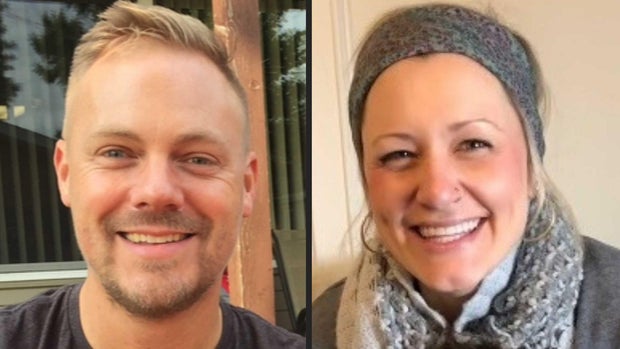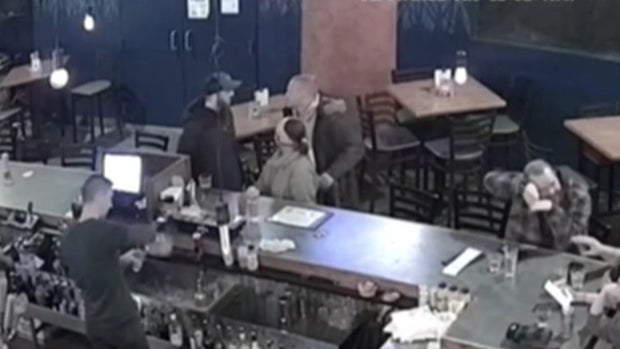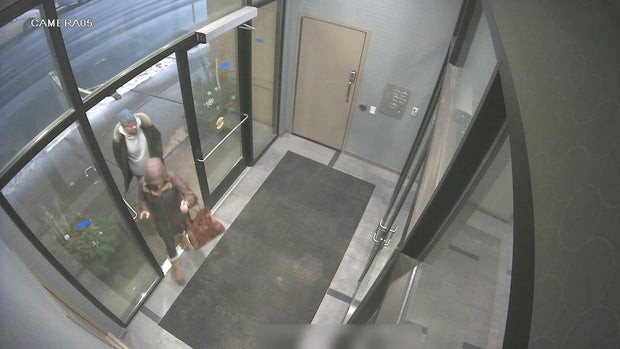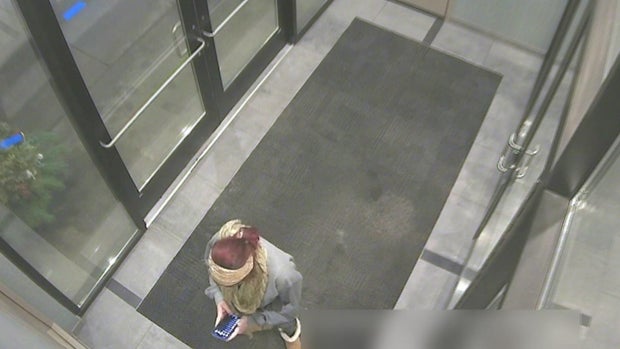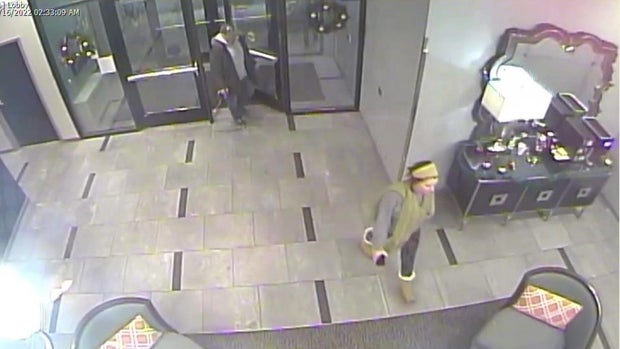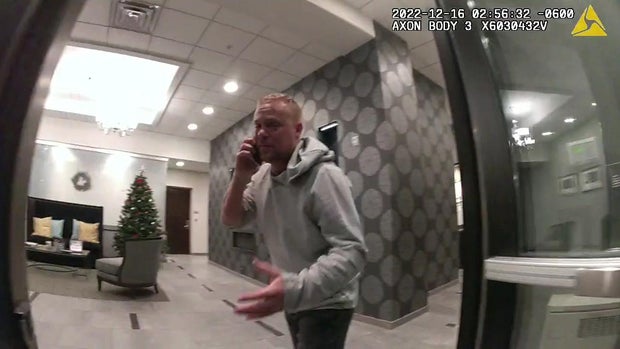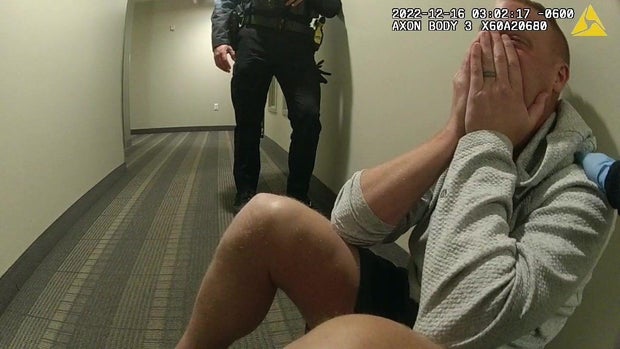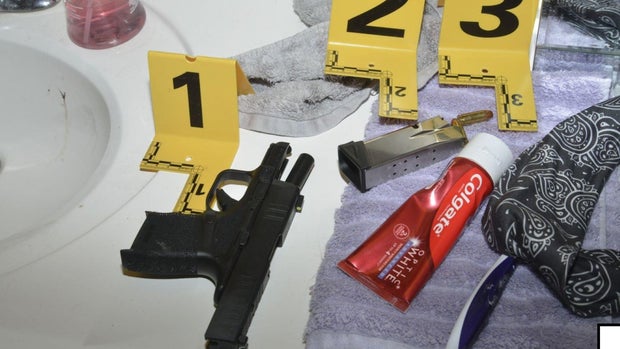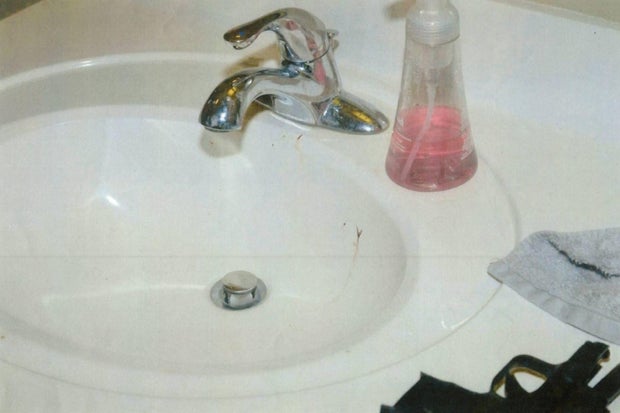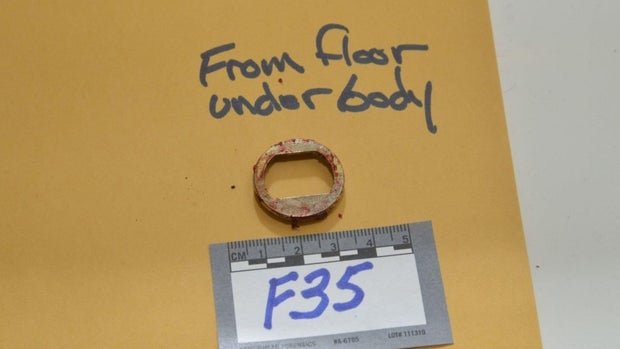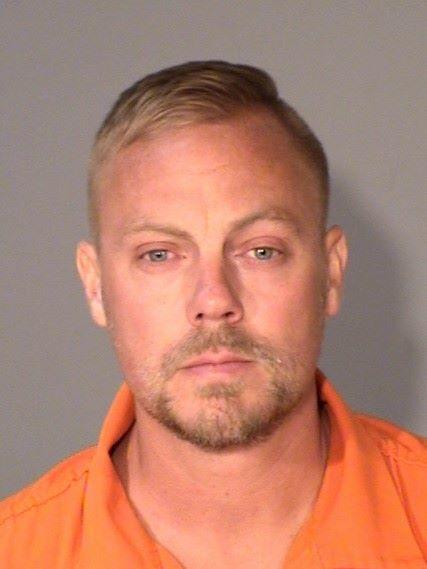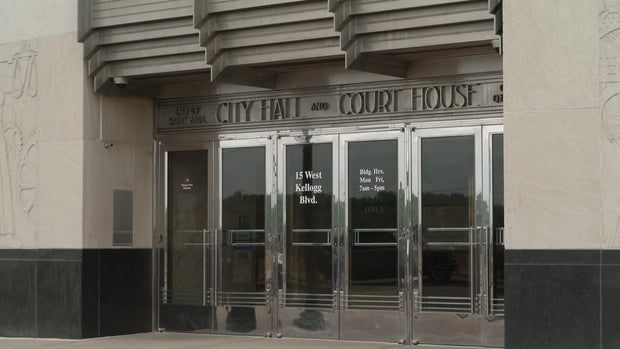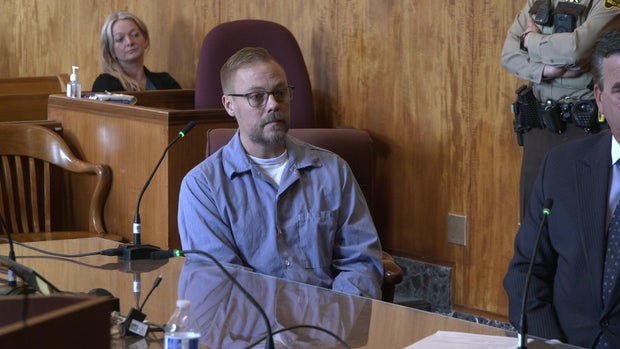CBS News
Tracking the hours before a young Minnesota woman became a murder victim

On Dec. 15, 2022, Matthew Ecker was headed to work when he said he got a frantic call from his former co-worker and friend Alex Pennig. He said Pennig told him she got in a fight with her boyfriend Shane Anderson and was scared of what he might do. So, Ecker took his gun, which he owned legally, and drove to Pennig’s St. Paul, Minnesota, apartment.
Terri Randall/Mary Jo Pennig
Ecker arrived around 2 p.m. He would later say his only reason for going to Pennig’s was to protect her.
Early the next morning, Pennig was shot dead in her apartment. Detectives used surveillance footage to piece together her final moments.
The altercation
Ramsey County District Court
Pennig and Ecker went out to a few bars that evening and ended up at Camp Bar at 12:30 a.m. on Dec. 16, 2022. Anderson was at the bar. Surveillance video shows he walked over to Pennig and began talking to her. Ecker walked over to the two of them. Things got heated, and when Ecker stepped in between Pennig and Anderson, Anderson punched him. Anderson was kicked out of the bar and Pennig and Ecker stayed for about an hour drinking and chatting.
Matthew Ecker and Alex Pennig arrive home for the night
Ramsey County District Court
At 2:05 a.m., Pennig and Ecker arrive at her apartment building after walking there from Camp Bar.
A return to the lobby
Ramsey County District Court
At 2:24 a.m., Pennig and Ecker are seen back in the lobby as they walk out of the building. Ecker would later say he was going to his car to get his headphones. Pennig (pictured) returned first and waited in the vestibule for Ecker. She paces around looking at her phone.
Alex Pennig last seen alive
Ramsey County District Court
Ecker returns two minutes after Pennig at 2:30 a.m. The two then walk through the lobby and go back up to Pennig’s apartment. This is the last time Pennig was seen alive.
St. Paul police officers arrive on scene
Ramsey County District Court
At 2:50 a.m., Ecker called 911 and reported that Pennig shot herself in the head. St. Paul police officers raced to the apartment building and Ecker let them inside at 2:56 a.m.
Matthew Ecker’s story
Ramsey County District Court
After leading police officers to Pennig’s apartment, Ecker sat in the hallway, appearing distressed and emotional. Officer Justina Hser approached him and began asking him what happened. Their conversation, which lasted nearly an hour, was captured on her body camera. Ecker told her everything was fine between him and Pennig and that they did not have an argument. He said she grabbed his gun out of his backpack, backed into the bathroom and locked the door. Moments later, Ecker said he heard a shot, so he broke open the bathroom door to find Pennig laying on the floor with a gunshot wound to her left temple.
The weapon
Ramsey County District Court
Responding officers located the gun. It was on Pennig’s chest with her left hand resting on top. They noted that this seemed odd. One officer then moved the gun to the sink (pictured) to place it in a safe position.
Notable evidence
Ramsey County District Court
Ecker had told officers he washed his hands after trying to help Pennig, which is why his hands were clean. But the officers noticed that the bathroom sink was dry when they arrived. If Ecker had just washed his hands, detectives believed the sink probably would have still been wet.
A lack of evidence on Matthew Ecker
Ramsey County District Court
Ecker was interviewed by detectives around 6:30 a.m. on Dec. 16, 2022. He had no visible blood on his body or his clothes. It was later discovered that Ecker also had no gunshot residue on him.
The defining evidence
Ramsey County District Court
While Ecker was being interviewed at the police station, the forensic unit processing the scene notified detectives that they had found a new piece of evidence once Pennig’s body was moved. It was a metal piece of the bathroom door lock, and it was discovered on the floor where Pennig’s head was. The detectives suspected that when Ecker broke open the door, that small metal piece landed on the bathroom floor. According to the detectives’ theory, Ecker broke open the bathroom door, then Pennig was shot and fell on top of the piece. They say this proves the bathroom door was forced open before Pennig was shot, and that Ecker had lied to them.
The accused: Matthew Ecker
Ramsey County Sheriff’s Office
On Dec. 19, 2022, Matthew Ecker is formally charged with second-degree murder. Ecker denies killing Alex Pennig.
The trial of Matthew Ecker
CBS News
On Feb. 8, 2024, Ecker’s trial begins. Eight days later, on Feb. 16, 2024, he is found guilty of second-degree murder.
Matthew Ecker sentencing
CBS News
On April 3, 2024, Ecker is sentenced to 30 years in prison. He is appealing his conviction.
CBS News
Trump argues Smith unlawfully appointed in documents and election cases
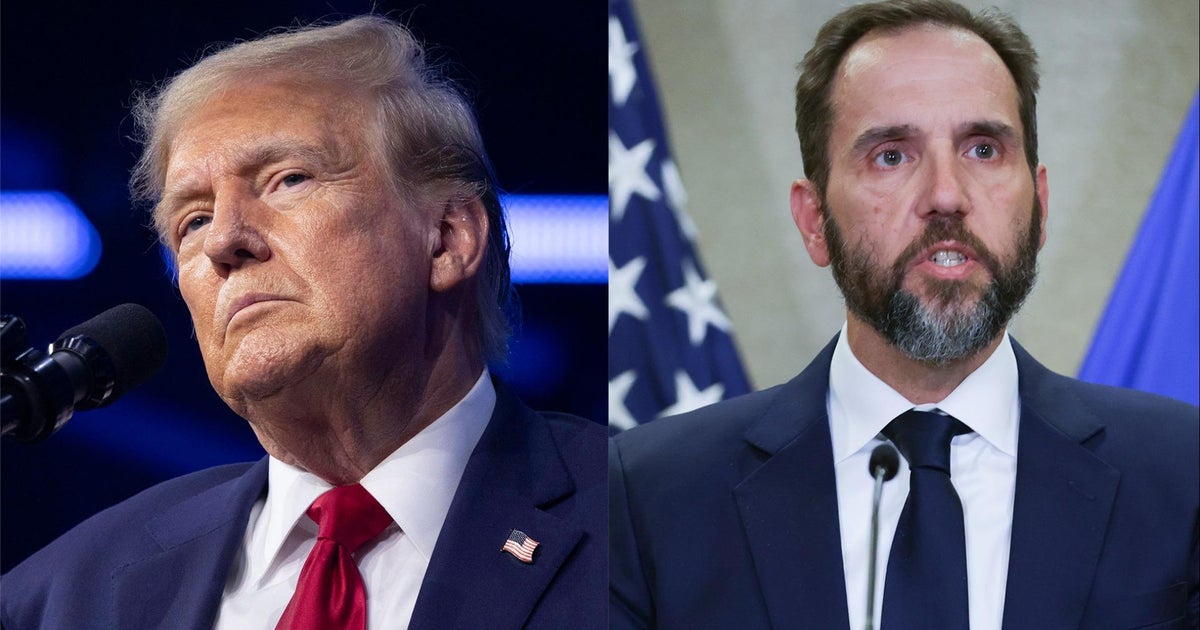
Washington — Former President Donald Trump urged two separate federal courts to toss out the criminal charges brought against him by special counsel Jack Smith, arguing in both instances that Smith was unlawfully appointed and did not have the legal backing to prosecute the cases.
Trump’s requests were made to the federal district court in Washington, D.C., which is overseeing the case stemming from the 2020 election, and the U.S. appeals court in Atlanta, which is reviewing a lower court ruling that dismissed the separate case that arose out of the former president’s alleged mishandling of documents marked classified.
In the case in Washington, Trump is seeking to file a motion to dismiss the four criminal charges brought against him based on the legality of Smith’s appointment of special counsel. A district court judge in South Florida, who is overseeing the documents case, ordered an end to that prosecution in July after she found Smith was unconstitutionally appointed and funded.
The special counsel appealed that decision earlier this year, arguing U.S. District Judge Aileen Cannon ruled incorrectly. He is expected to also oppose Trump’s bid to toss out the charges stemming from what prosecutors allege was an illegal effort by the former president to hold onto power after the 2020 election.
The documents case
The federal appeals court is set to decide whether to revive Smith’s prosecution of Trump over his handling of sensitive government records and alleged attempts to obstruct the Justice Department’s investigation.
But in a filing with that court, the U.S Court of Appeals for the 11th Circuit, submitted Friday, Trump’s legal team argued the ruling from Cannon, who was appointed by the former president, was sound and should stand.
“There is not, and never has been, a basis for Jack Smith’s unlawful crusade against President Trump,” his lawyers wrote. “For almost two years, Smith has operated unlawfully, backed by a largely unscrutinized blank check drawn on taxpayer dollars.”
They argued the appeal involved issues that present risks to the institution of the presidency and said the district court’s decision was correct based on text, history, structure and practices.
Prosecutors allege Trump kept sensitive government documents at his South Florida property, Mar-a-Lago, after leaving the White House in January 2021 and stymied government efforts to retrieve the records. The special counsel also charged Trump and two employees with impeding the federal investigation. He and his two co-defendants, Walt Nauta and Carlos de Oliveira, pleaded not guilty. Cannon dismissed the charges against all three defendants.
The FBI recovered more than 100 documents bearing classification markings during a court-authorized search of Mar-a-Lago in August 2022 and prosecutors later revealed that boxes of records were kept on a stage in the estate’s ballroom, in a bathroom and shower, and in a storage room.
Trump has claimed that the criminal case against him is politically motivated and denied wrongdoing. He sought to dismiss the indictment on numerous grounds, including the argument that Smith didn’t have the legal authority to file the charges at all because of the way Attorney General Merrick Garland appointed him in 2022.
The former president’s legal team argued Smith’s independent position within the Justice Department violated the Constitution. But Smith’s team pushed back, arguing in court filings that the naming of a special counsel was backed by Justice Department precedent that had been validated in previous cases by other federal courts.
The most recent involved the appointment of Robert Mueller in 2017 to oversee an investigation into Russia’s efforts to interfere in the 2016 presidential election. The federal appeals court in Washington, D.C., upheld Mueller’s appointment in 2019.
Cannon held several days of arguments in June to consider the constitutionality of Smith’s appointment before issuing her decision tossing out the 40 charges the former president faced.
“The bottom line is this: The Appointments Clause is a critical constitutional restriction stemming from the separation of powers, and it gives to Congress a considered role in determining the propriety of vesting appointment power for inferior officers,” she wrote. “The special counsel’s position effectively usurps that important legislative authority, transferring it to a head of department, and in the process threatening the structural liberty inherent in the separation of powers.”
In addition to finding that Smith’s appointment violated the Appointments Clause, Cannon said the special counsel’s office has been drawing funds from the Treasury without statutory authorization in violation of the Appropriations Clause.
Cannon’s decision — and Trump’s filings — cited a concurring opinion from Justice Clarence Thomas in the 2020 election case involving Trump, which he sought to dismiss on the grounds of presidential immunity. The Supreme Court ruled former presidents are shielded from prosecution for official acts taken while in the White House, and Thomas wrote separately to question the legality of Smith’s appointment. No other justice joined Thomas’ opinion and it is not binding.
Smith asked the 11th Circuit to review Cannon’s decision and resurrect the case against Trump, arguing the special counsel was “validly appointed” by the attorney general and properly funded.
“In ruling otherwise, the district court deviated from binding Supreme Court precedent, misconstrued the statutes that authorized the special counsel’s appointment, and took inadequate account of the longstanding history of attorney general appointments of special counsels,” prosecutors said in their opening brief to the appeals court.
The question of whether Smith was lawfully appointed could end up before the Supreme Court.
The 2020 election case
Proceedings in the election case in Washington had been on hold for months while the Supreme Court weighed whether Trump was entitled to immunity from prosecution, but they resumed in September. In the wake of the high court’s decision, a federal grand jury returned a superseding indictment that charged Trump with four felony counts but narrowed the allegations against him to comply with the high court’s new framework for presidential immunity.
Trump pleaded not guilty. He is expected to again seek to have the case dismissed on immunity grounds, but in a filing Thursday, also argued that the charges should be tossed out because Smith was unlawfully appointed. The former president also wants the judge to prohibit the special and his office from spending any more public dollars.
“Everything that Smith did since Attorney General Garland’s appointment, as President Trump continued his leading campaign against President Biden and then Vice President Harris, was unlawful and unconstitutional,” Trump’s lawyers wrote.
They said their proposed motion to dismiss the indictment “establishes that this unjust case was dead on arrival — unconstitutional even before its inception.”
Trump’s team argued that Smith’s appointment is “plainly unconstitutional” because he was not nominated by the president and confirmed by the Senate.
As to the special counsel’s funding, the defense claimed that Smith has been operating with a “blank check.”
Smith is expected to have a turn at bolstering his appointment in the coming weeks and will likely echo the defenses he deployed in the classified documents case.
Chutkan, as a federal judge in Washington, does not have to adhere to the ruling in Trump’s other prosecution and has indicated she disagrees with Cannon’s conclusion that Smith’s appointment was outside constitutional bounds.
During a September hearing, Chutkan said she didn’t find that ruling to be “particularly persuasive” and noted she is bound by the 2019 decision from the D.C. Circuit upholding an earlier special counsel appointment.
Trump is vying for a second term in the White House and has said he would fire Smith “within two seconds” if he defeats Vice President Kamala Harris in the presidential election.
CBS News
From the archives: VP Dick Cheney on potential 2003 invasion of Iraq

Watch CBS News
Be the first to know
Get browser notifications for breaking news, live events, and exclusive reporting.
CBS News
From the archives: President George W. Bush on “Face the Nation” in 2006

Watch CBS News
Be the first to know
Get browser notifications for breaking news, live events, and exclusive reporting.


